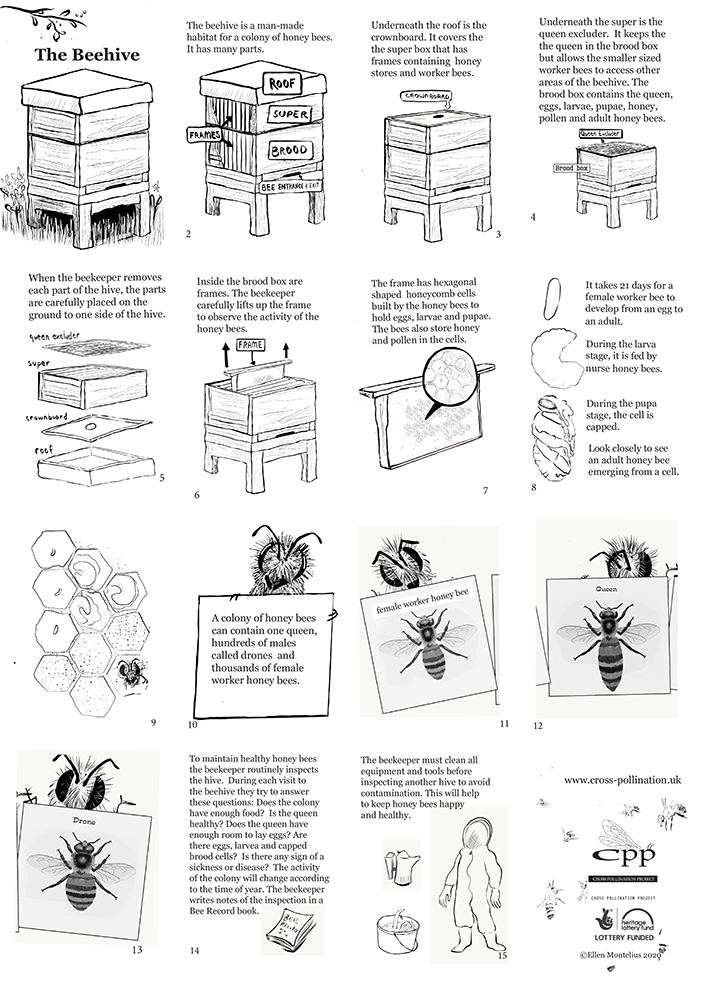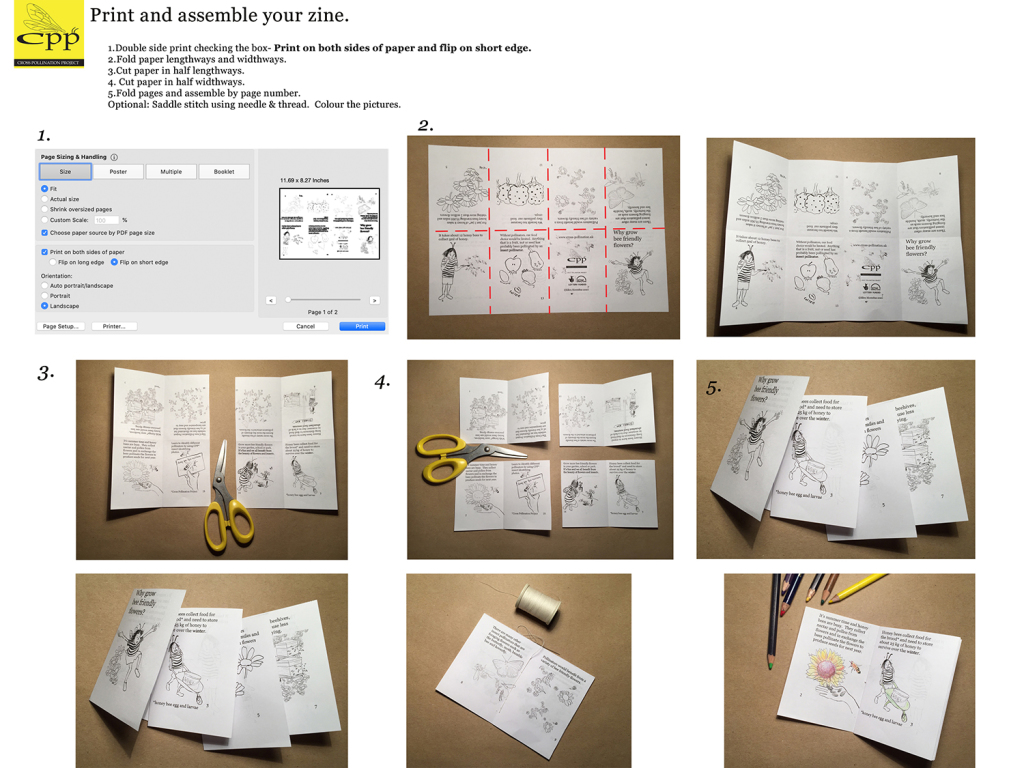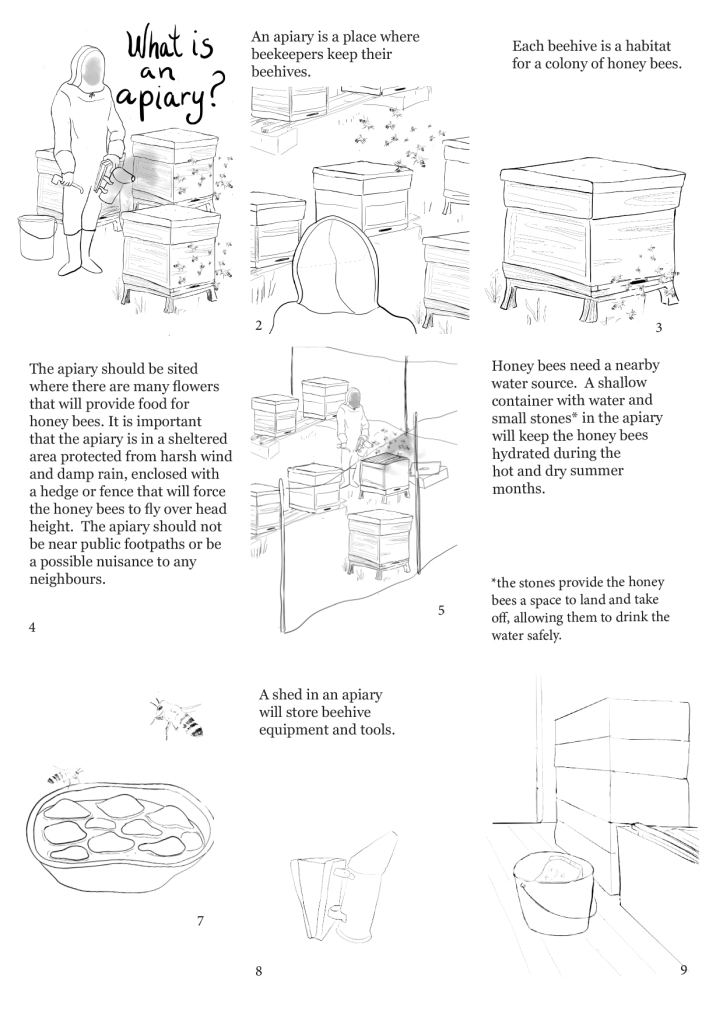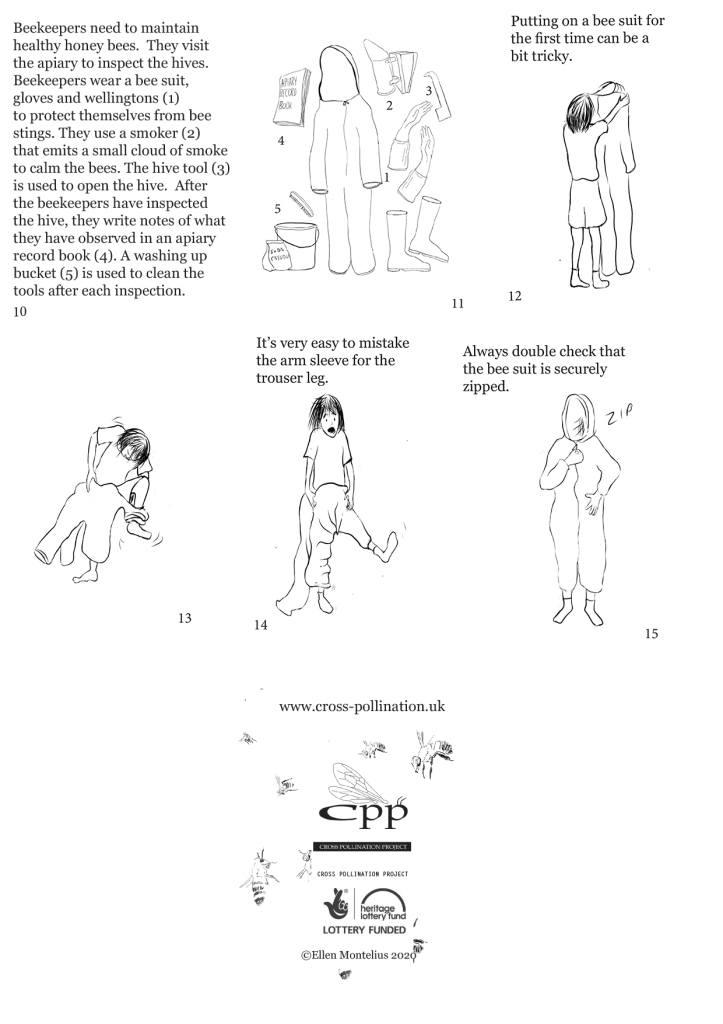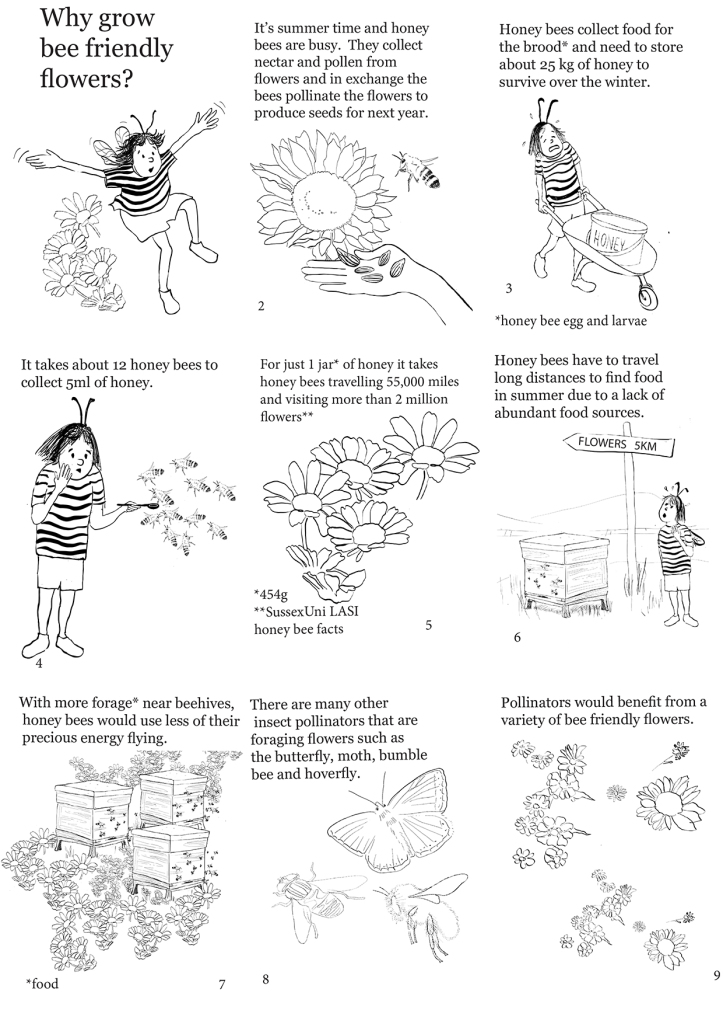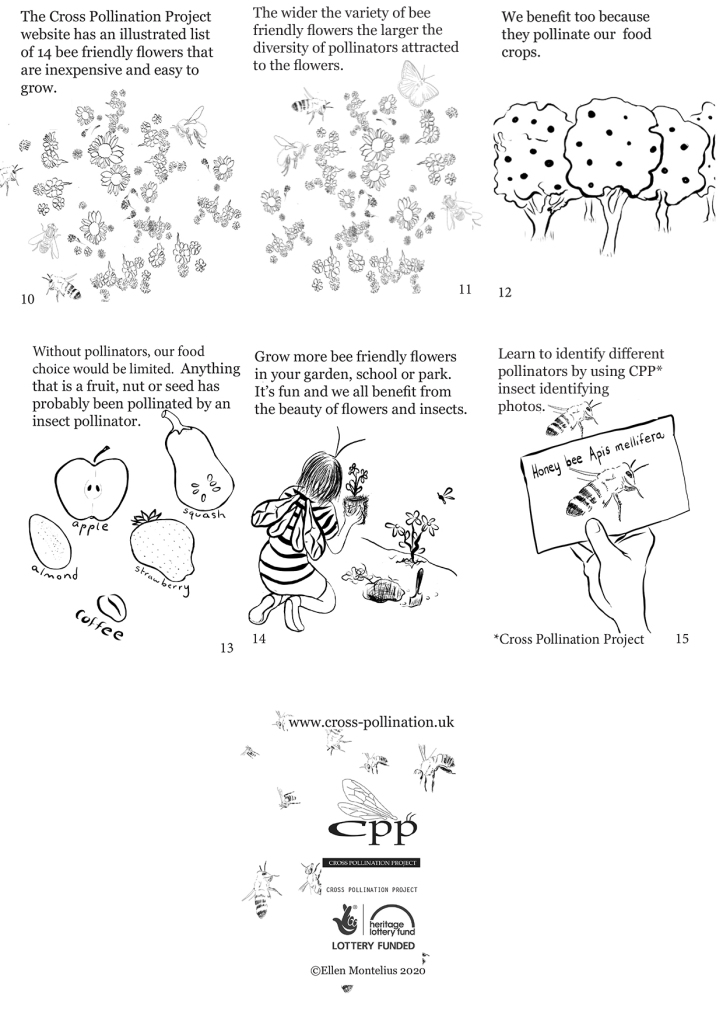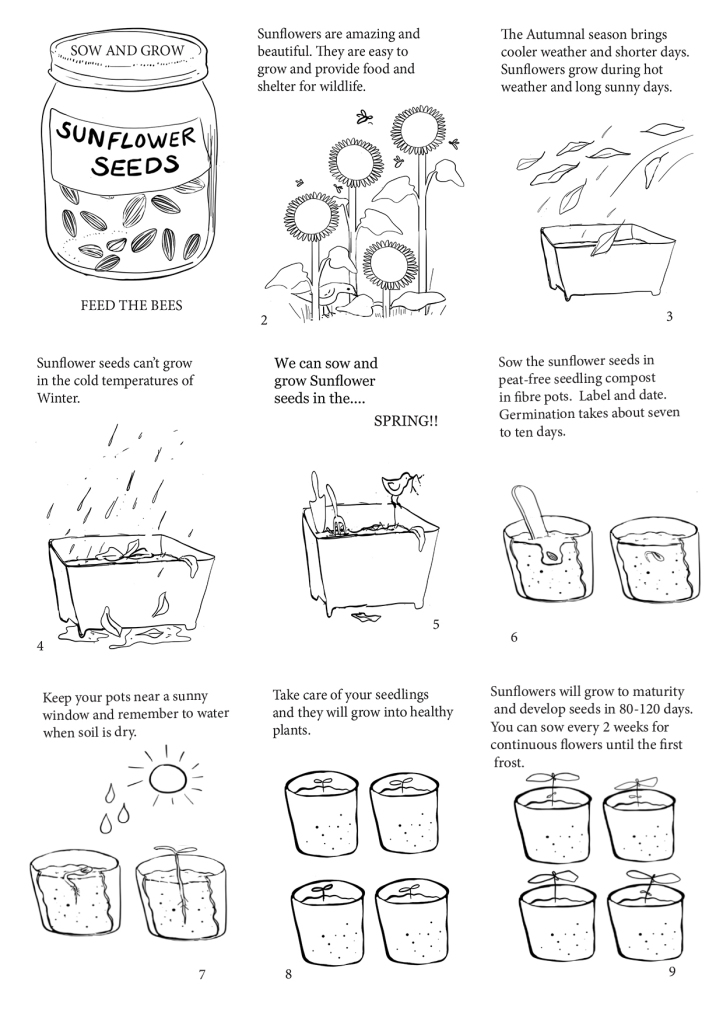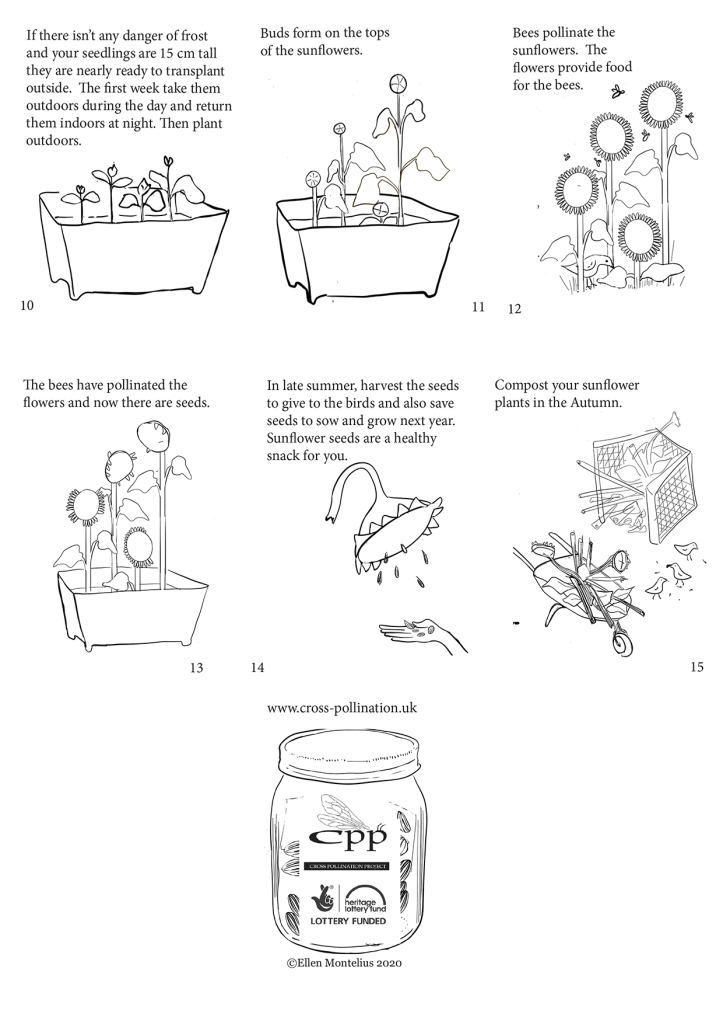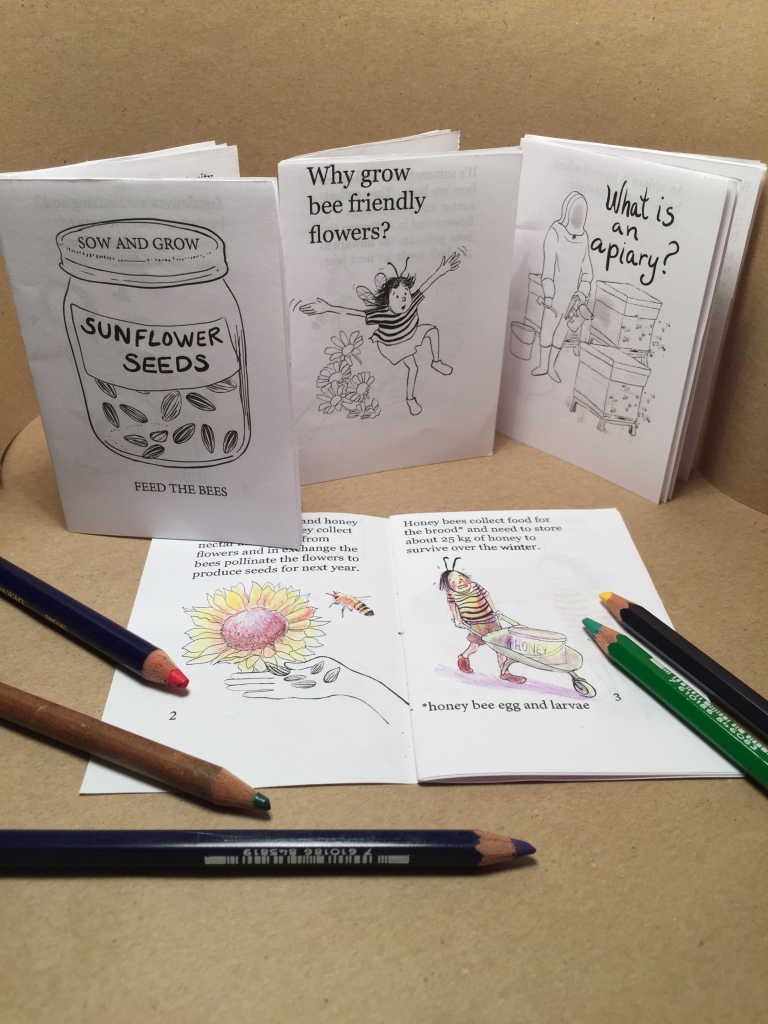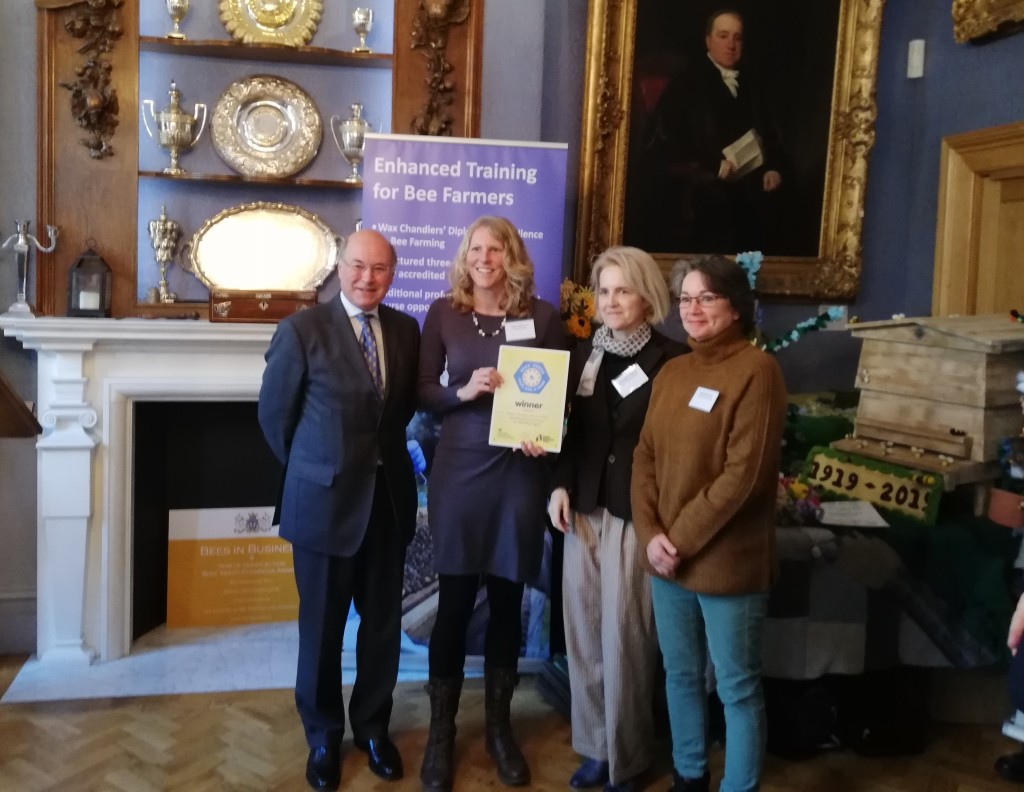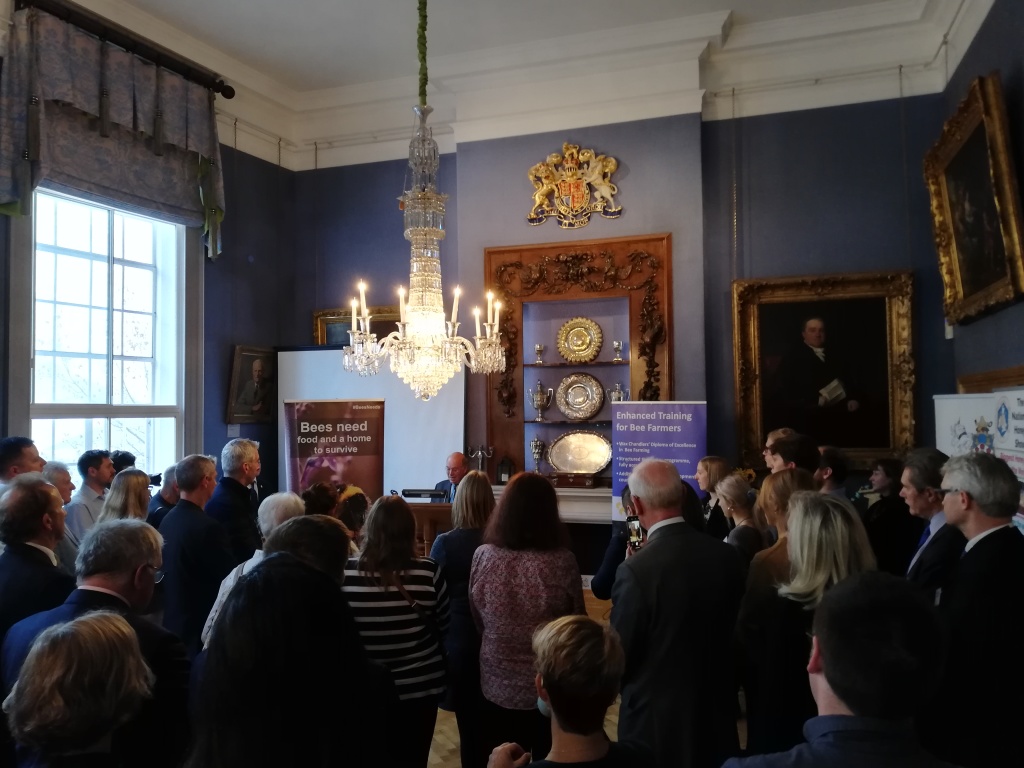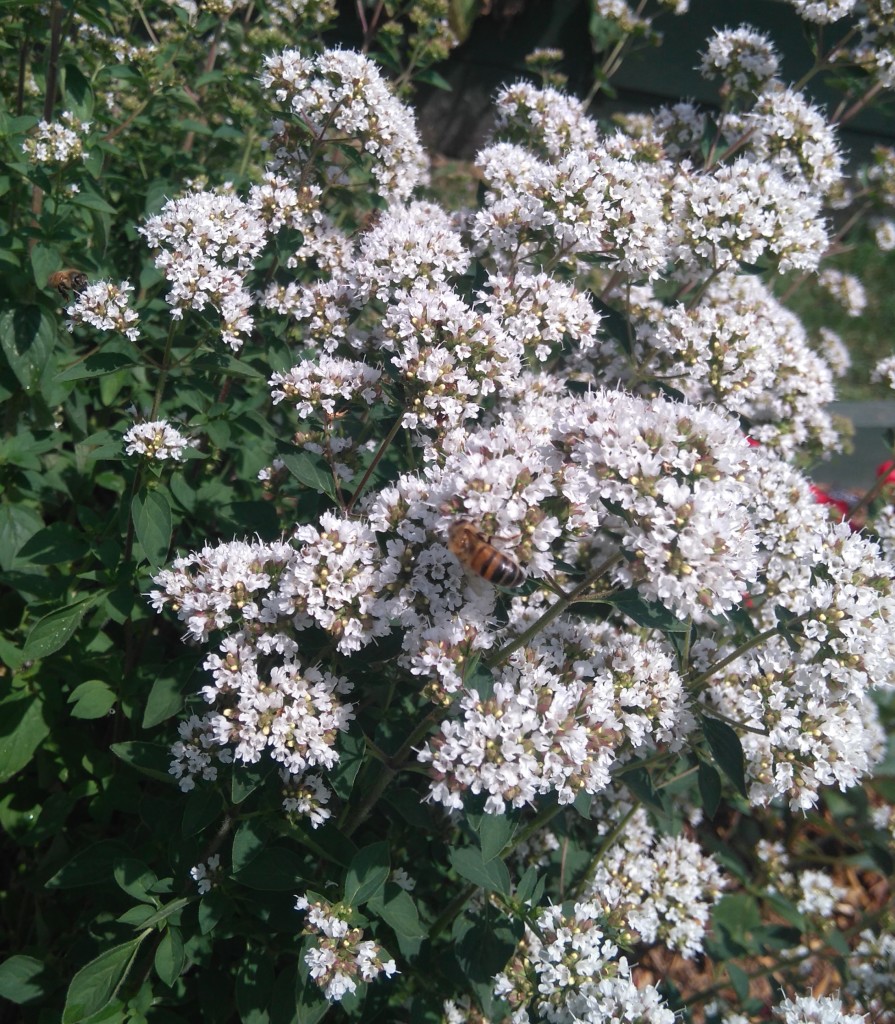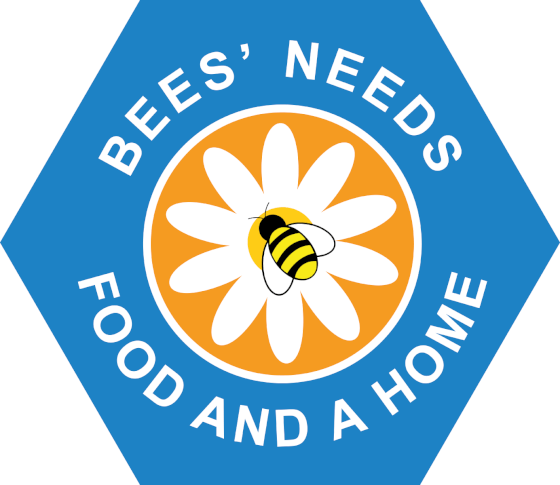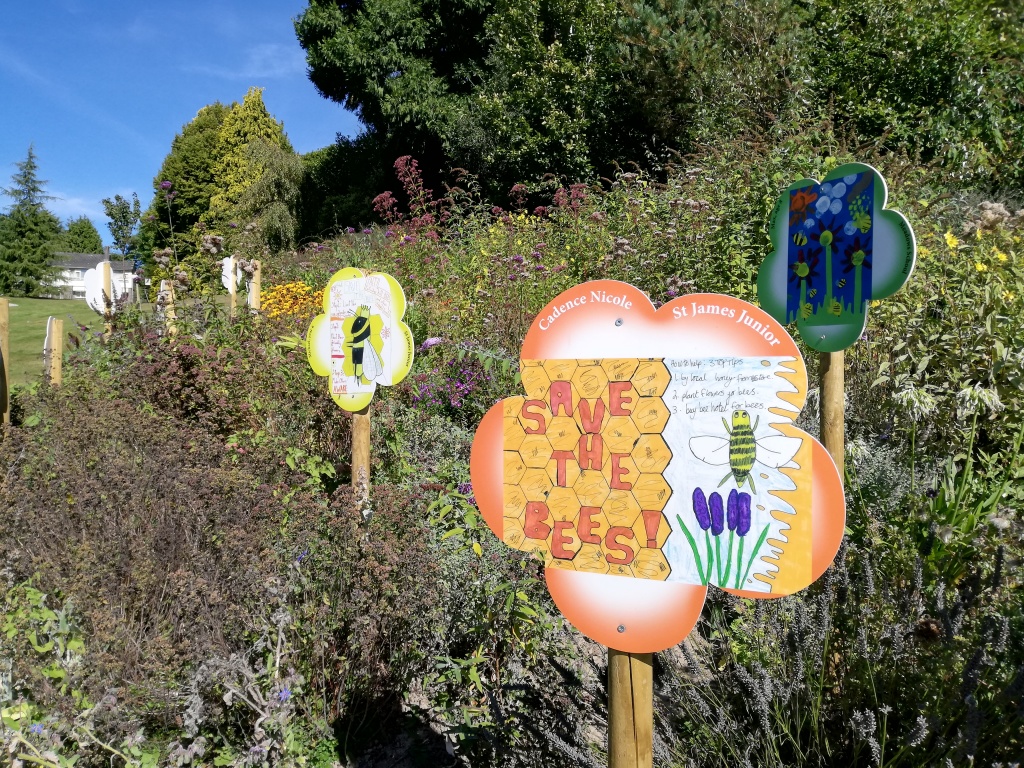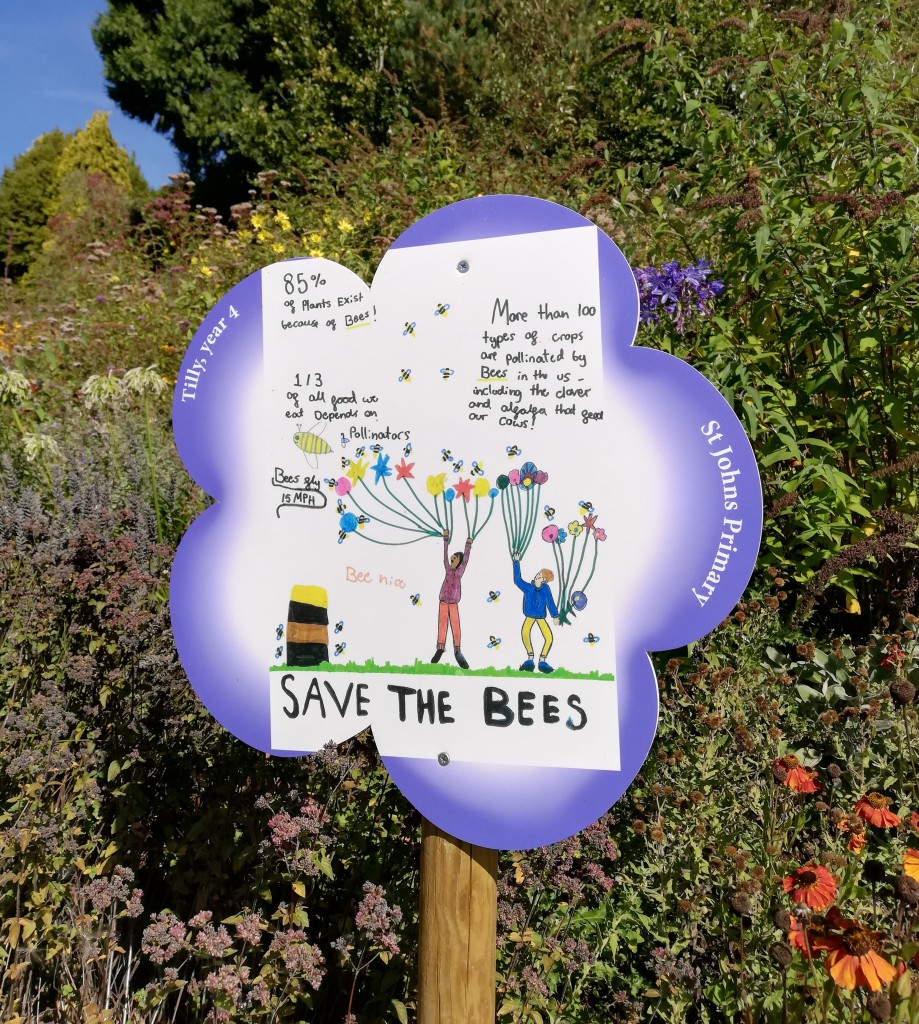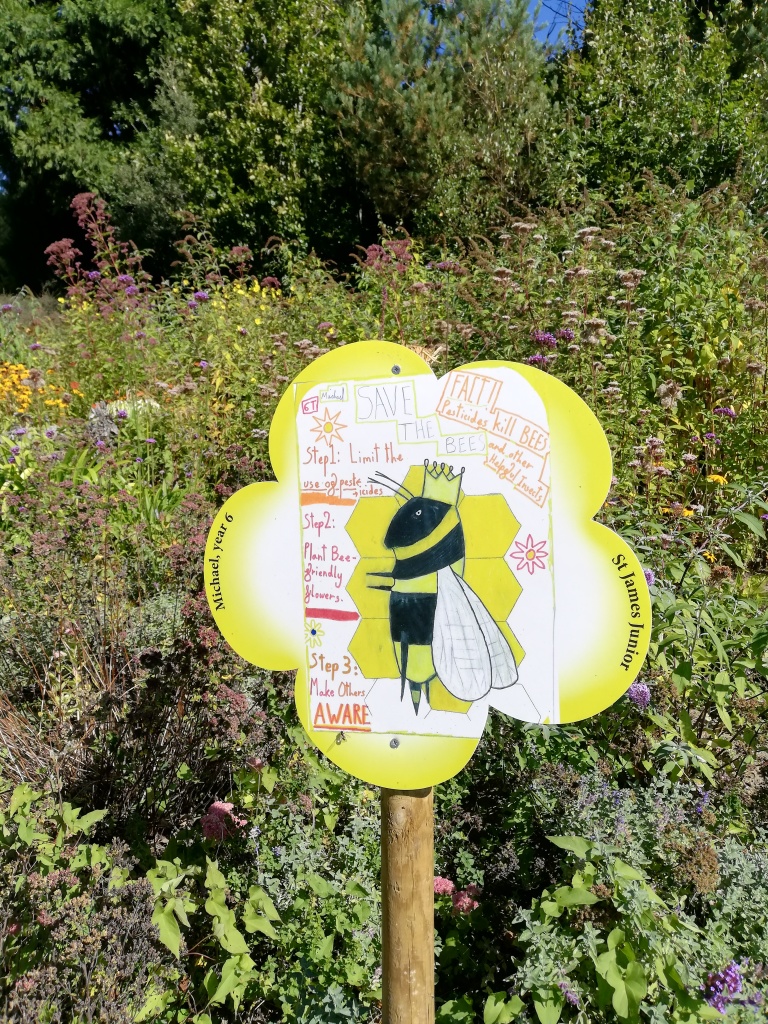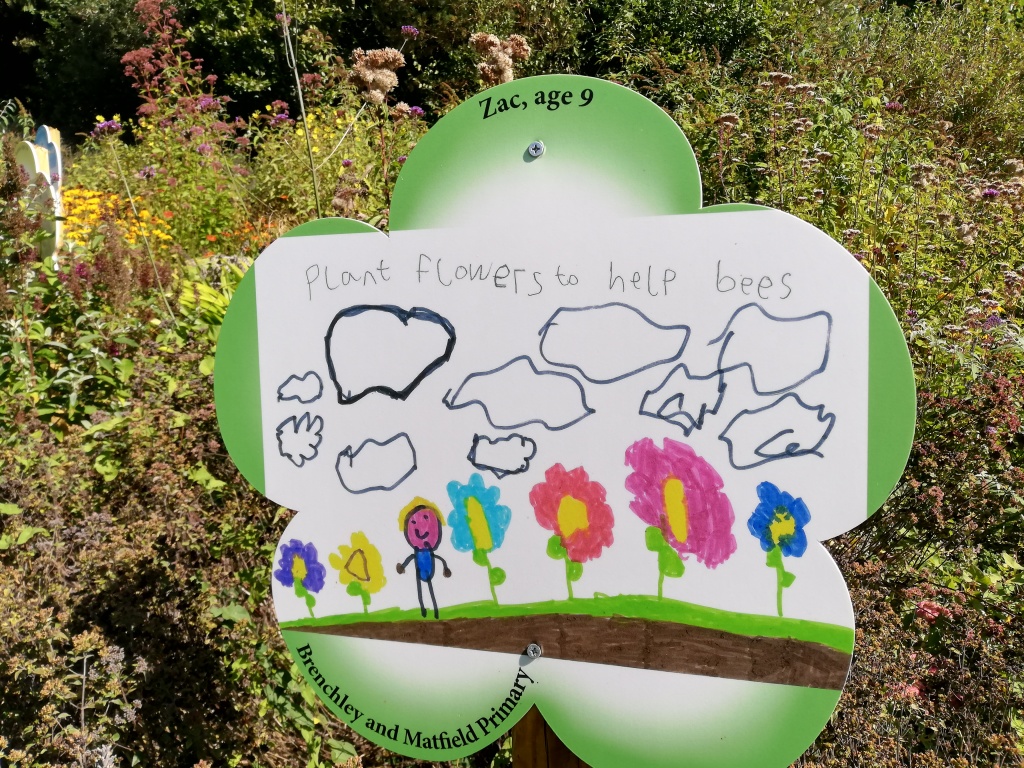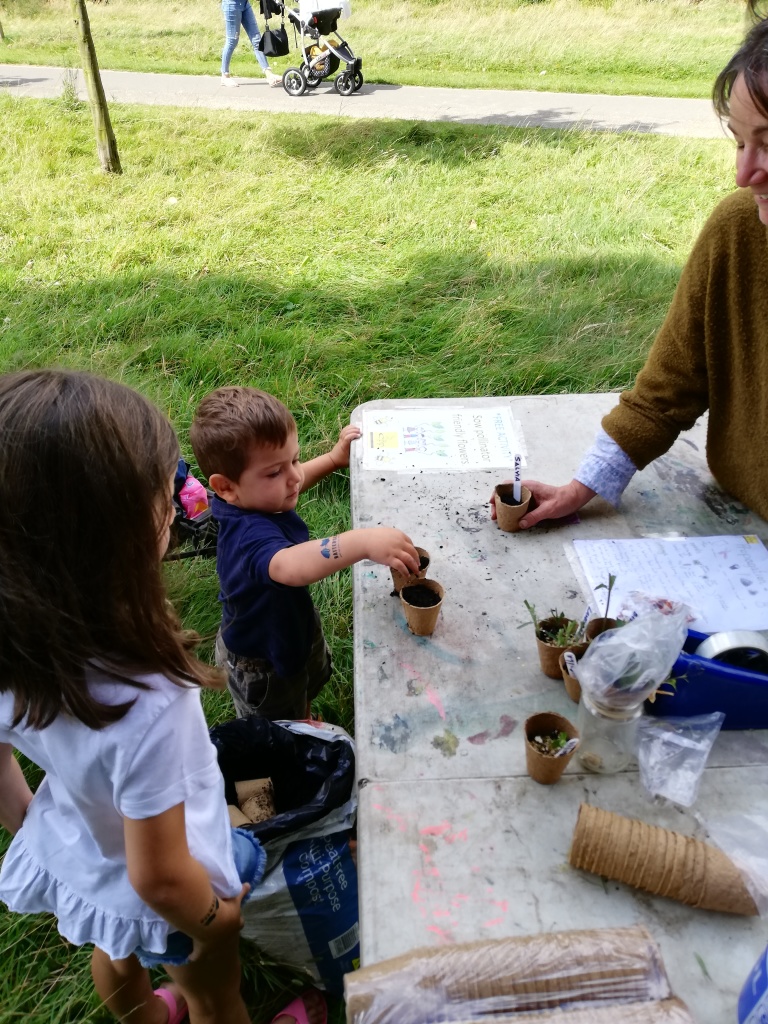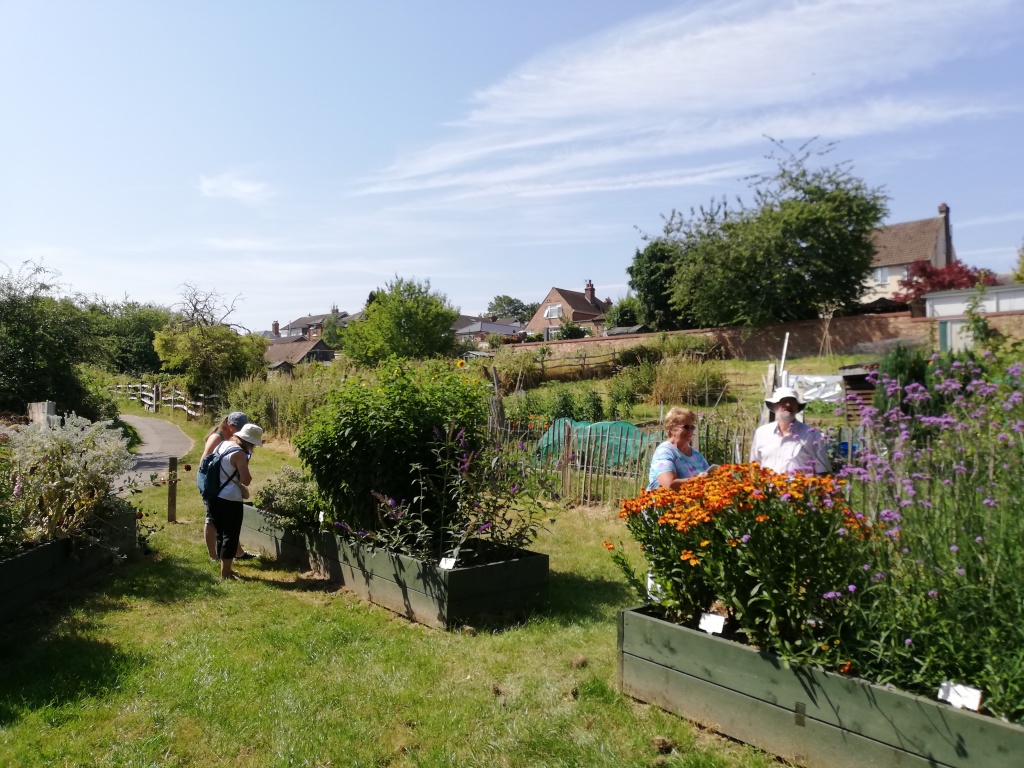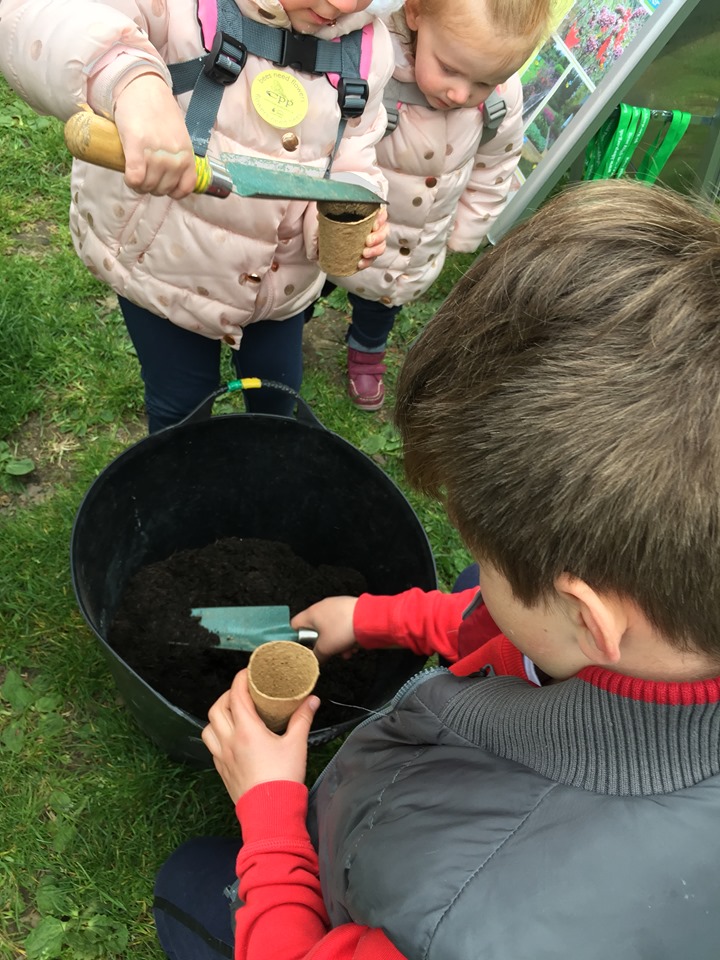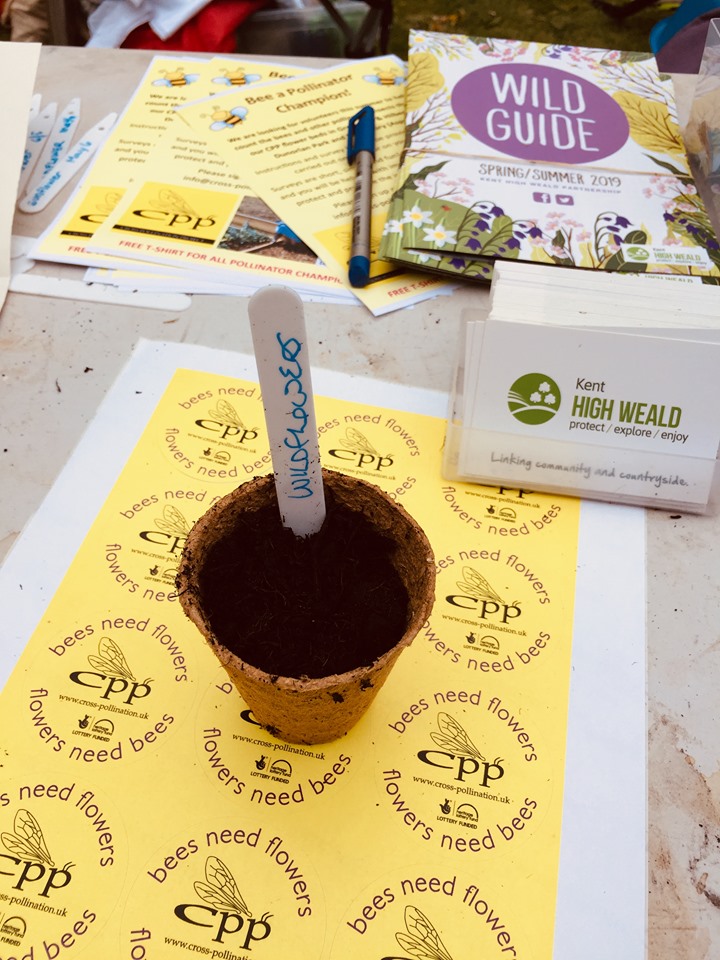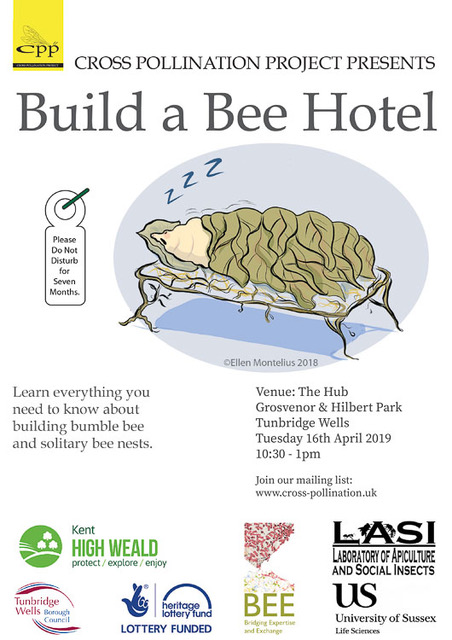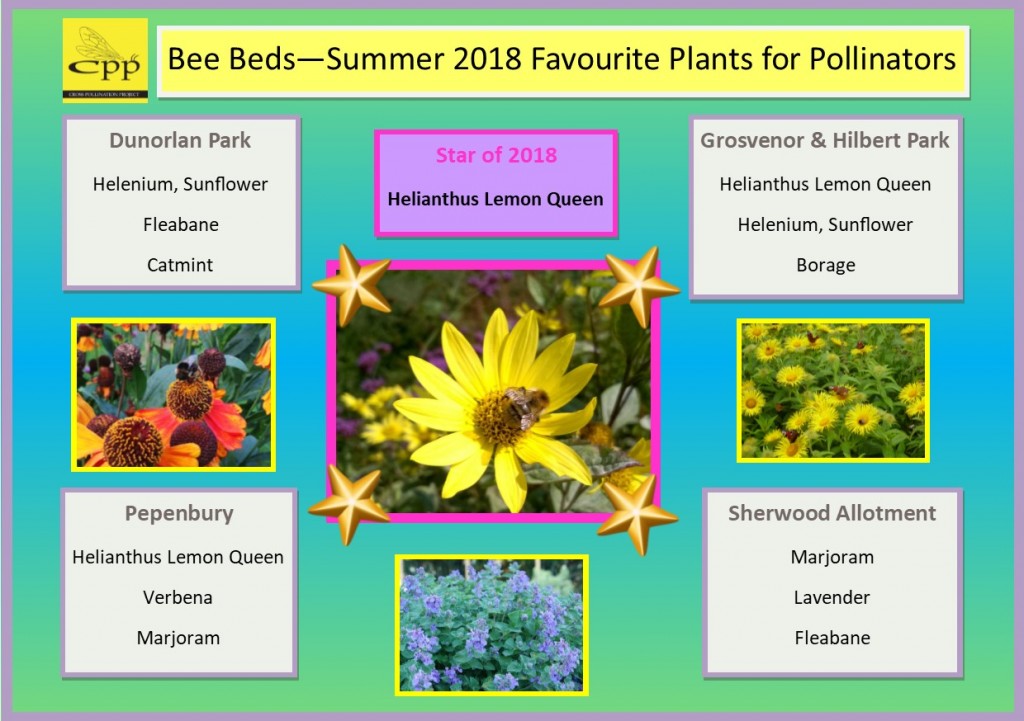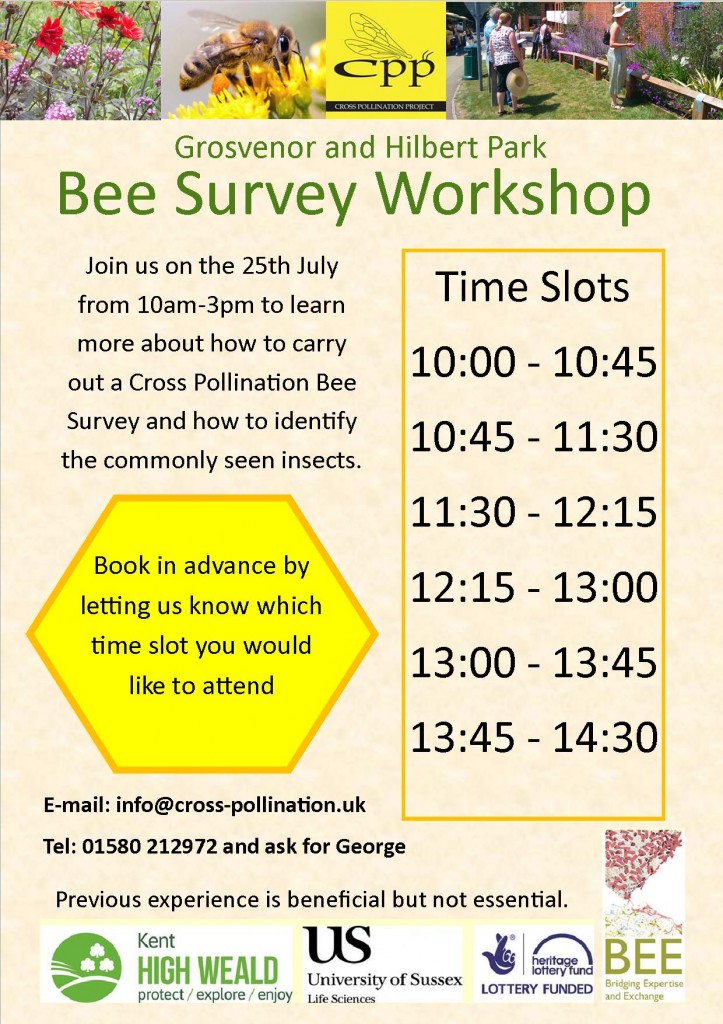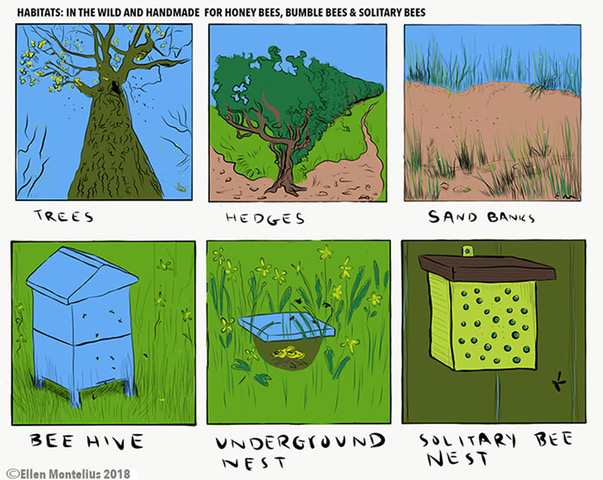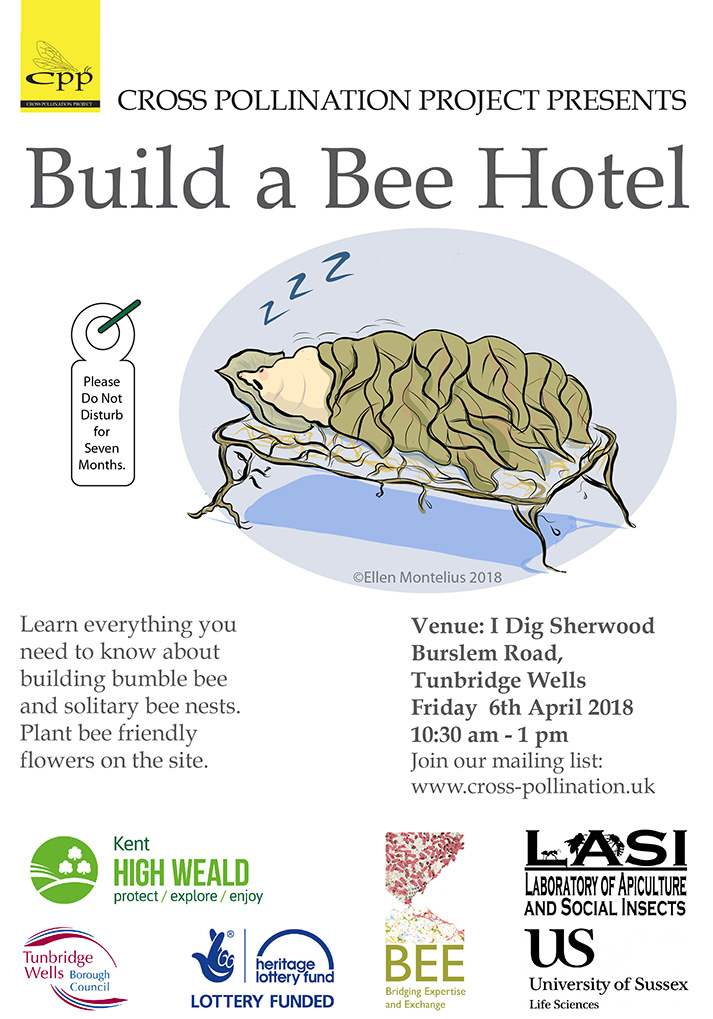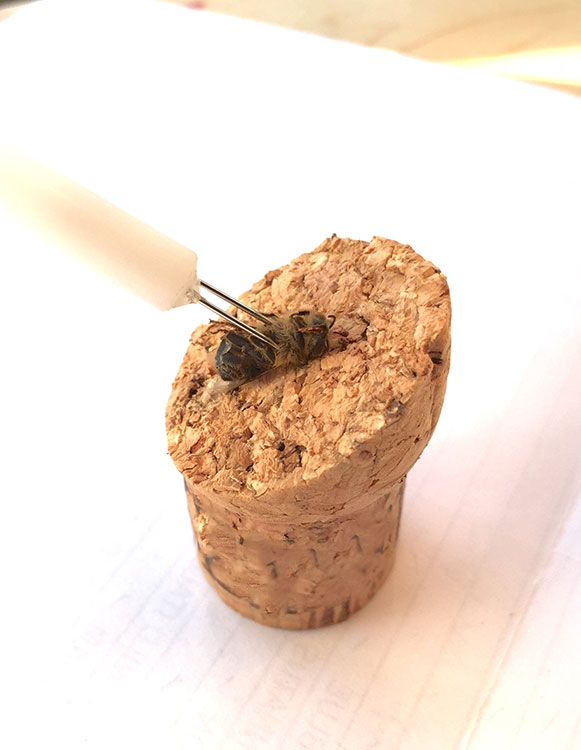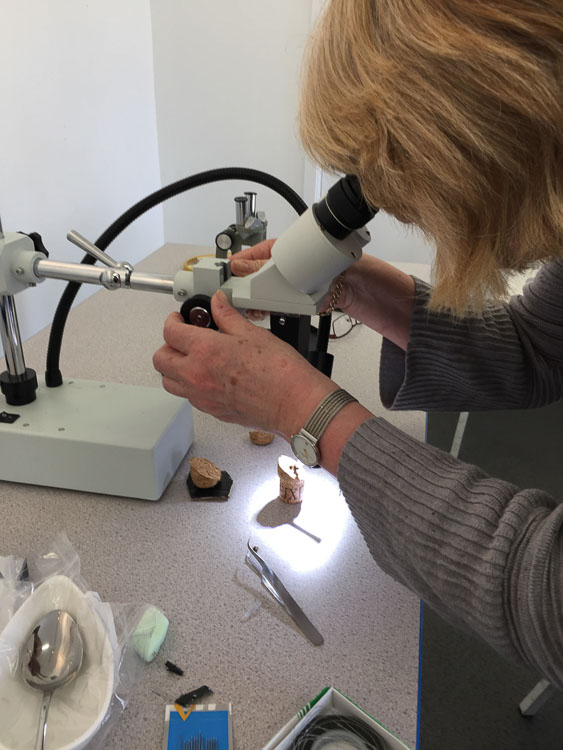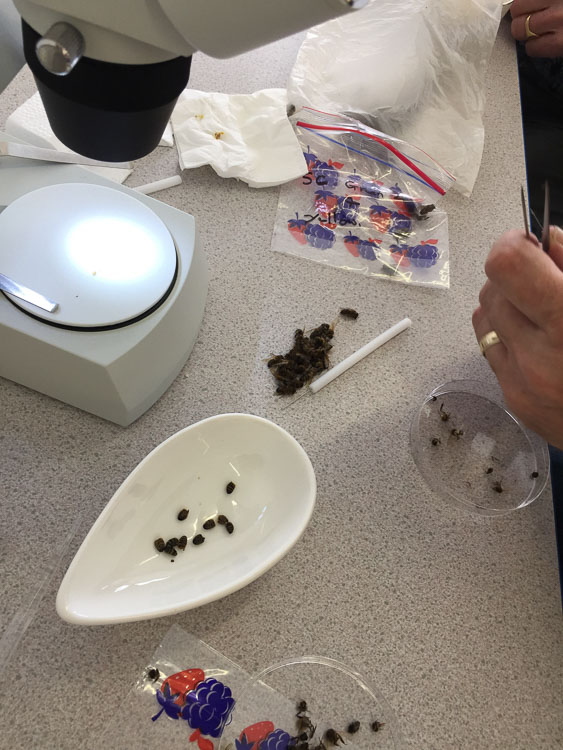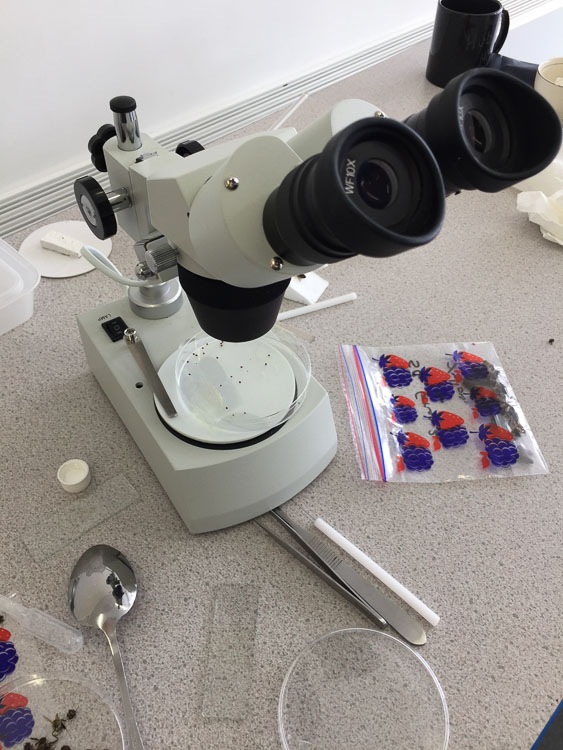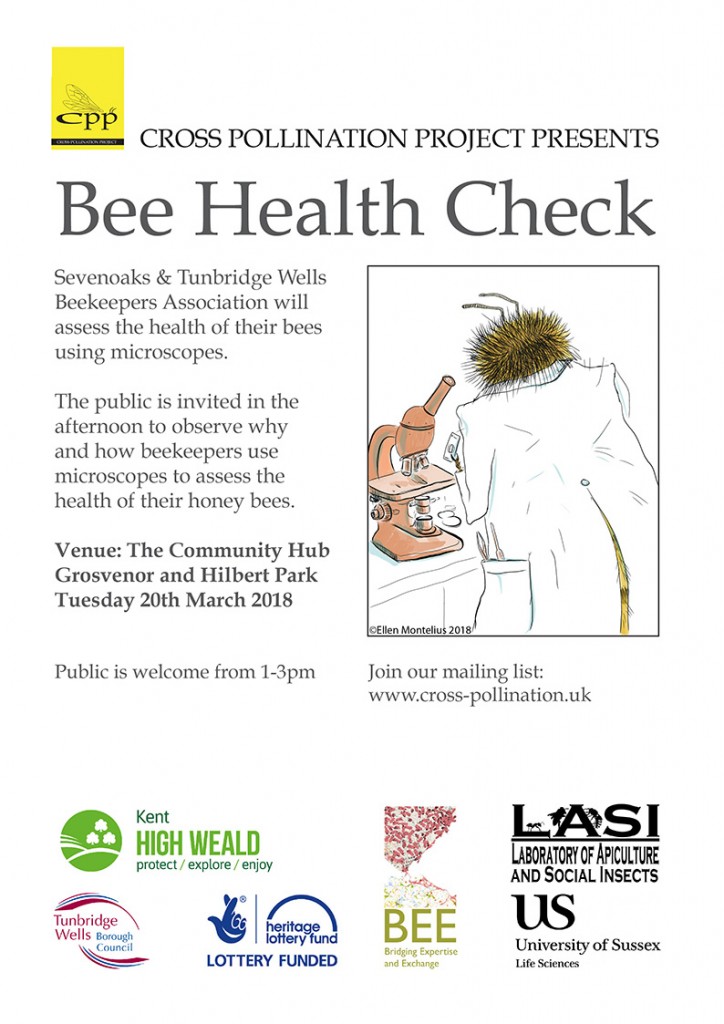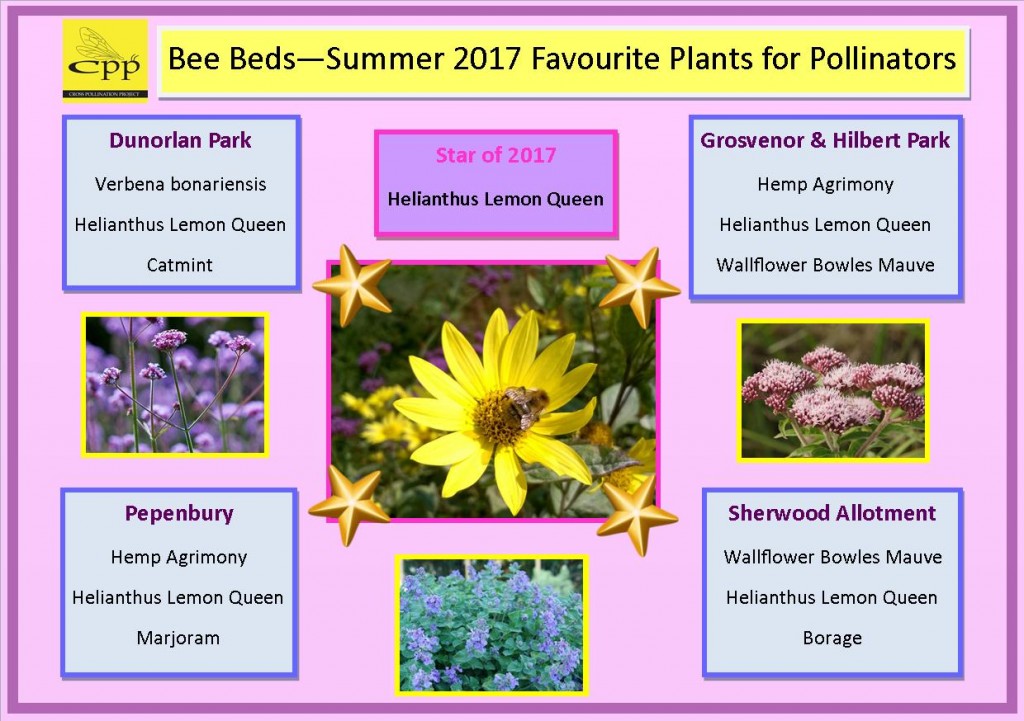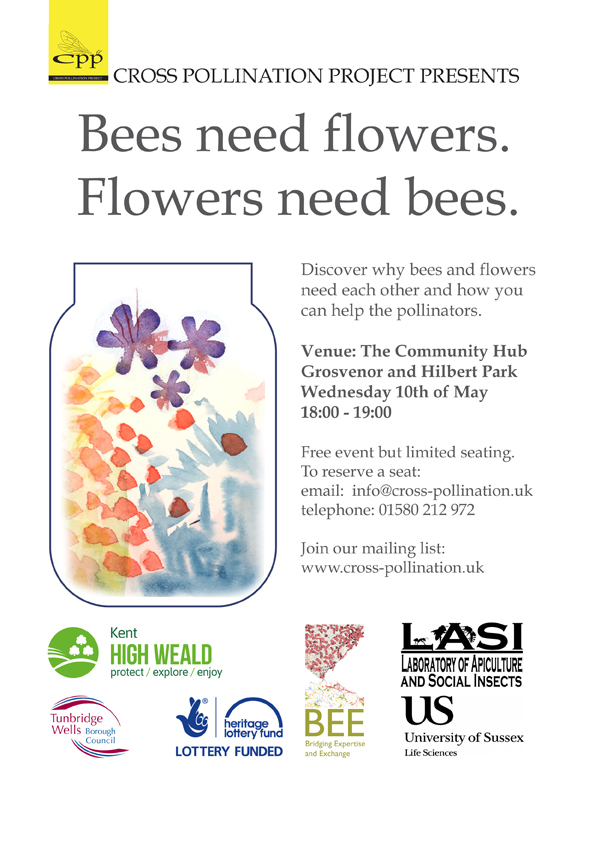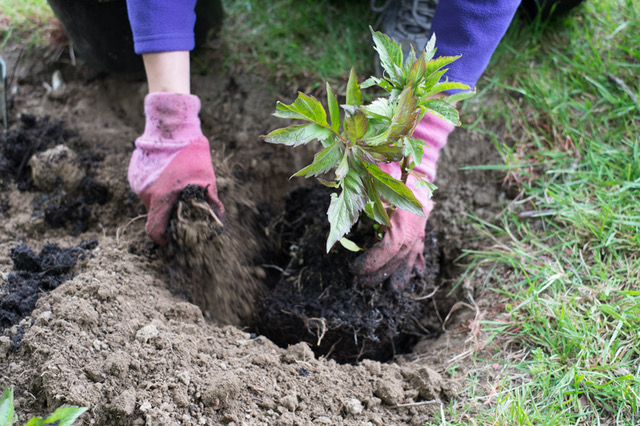The Cross Pollination Project was kindly funded by the Heritage Lottery Fund from 2016 to 2020. Much of the project is now complete, but we hope to continue this important work and carry on expanding and maintaining the establishment of pollinator friendly gardens and green spaces. If you would like to get involved or would like advice on how to make your growing space more wildlife friendly, please get in touch with us.
CPP comic book number 4 – The Beehive
The Beehive
HAPPY MAY DAY ! THE BEES ARE OUT NOW AND BUSY POLLINATING!!
Ever wondered how a beehive works? Check out the new comic book below to find out
Here is the pdf version for printing the beehive comic book
Here is the pdf of the instructions for printing and assembling the mini book diyzine2
Below is a view of the mini book
Below viewable easy instructions for constructing your book
CPP comic book number 3 – What is an Apiary?
What is an apiary?
SPRING IS ON THE WAY … FLOWERS ARE BLOOMING AND THE BEES ARE BUZZING!!
In march the queen has been busy laying eggs. As the weather gets warmer the beekeepers head to their apiaries for their first inspection.
The comic book below shows what the beekeepers do to help our honeybees stay healthy.
Here is the pdf version for printing the whatisapiaryfinal comic book
Here is the pdf of the instructions for printing and assembling the mini book diyzine2
Below is a quick view of the mini book (not for printing)
Below viewable easy instructions for constructing your book
CPP comic book number 2 – Why Grow Bee Friendly Flowers?
Why Grow Bee Friendly Flowers
HAPPY VALENTINES DAY!! The perfect day to think about flowers.
Even though it is February and still feels chilly and windy, it is actually a good time to start thinking about our summer gardens and how we can help feed the bees. Have a look below at our second CPP comic book which tells you all about why it is so important and easy to provide food for our bees in the summer. There is a pdf version ready to download, print, colour as well as easy instructions to make your own mini book.
Here is the pdf version for printing the growflowers comic book.
Here is the pdf of the instructions for printing and assembling the mini book diyzine2
Below is a quick view of the mini book (not for printing)
Below viewable easy instructions for constructing your book
CPP Comic Book number 1 – Sow and Grow Sunflower Seeds
Sow and Grow Sunflower Seeds
Get thinking about your summer sunflowers and all the happy bees that will be buzzing around them! Its so easy to FEED THE BEES with the right flowers!!
Here is our first CPP comic book with a pdf ready to download, print, colour and easy instructions below to make your own mini book. Happy colouring!
Here is the pdf version for printing the sunflowerzine
Here is the pdf of the instructions for printing and assembling the mini book diyzine2
Below is a quick view of the mini book (not for printing)
Below viewable easy instructions for constructing your book
CPP comic book series coming soon – Happy New Year 2020!!
Happy New Year!! CPP is celebrating 2020 with a series of accessible print on demand mini books on raising awareness of the plight of bees and encouraging people to grow flowers
for pollinators. CPP comic book series are easy to assemble, inexpensive and a great tool for educators.
The mini books will each have a different focus: on growing sunflower seeds, an apiary and habitats for pollinators.
The mini books will be downloadable and ready to colour in and assemble.
Year Of Green Action Bee’s Needs Champions Awards – 18th November 2019
Defra Bees Needs Awards 2019 Ceremony
CPP and Kent High Weald Partnership went to The Wax Chandlers Hall in London to receive our Defra Bees Needs Award. A great day out meeting all sorts of interesting people from all over England who are involved in different projects to help bees.
We were even served honey cake and honey champagne!!
Cally, Elizabeth and Ellen receiving the award
CPP Star Survey Plant of 2019 is our native British species Marjoram!!
Plant marjoram everybody!! Easy to grow and its a native British species!
Our star pollinator plant of summer 2019 – Marjoram! Not only has it attracted the largest number of pollinators but also the greatest variety of pollinators!
Other popular plants with our little flying friends were the fleabane, hemp-agrimony, verbena bonariensis and helianthus. Thank you to all our volunteers who helped survey the beds this year.
“Defra Year of Green Action Awards Bees Needs Awards”
Exciting news for CPP! We won an award!!
We are pleased to announce that the work we have done at Dunorlan and Grosvenor & Hilbert Parks building, planting and surveying our pollinator flower beds has been awarded a Year of Green Action Bees’ Needs Champions Award at the “Defra Year of Green Action Awards Bees Needs Awards”
Huge huge thanks to all the volunteers and schools that helped with the project and continue to do so. Our pollinators need us!
BEE ART competition at CPP Dunorlan Bee Border – September /October 2019
New art work at the CPP Dunorlan Bee Border
This year’s winners of the Tunbridge Wells in Bloom “Bee Art” competition are on proud display in the CPP Dunorlan Park bee border. Local school children have designed fantastic art work promoting the importance of bees and how flowers are vital for our pollinators.
Check them out!
Seed Sowing and Propogation Workshop – 7th August 2019
CPP Guided Survey – 25th July 2019
Seed Sowing for Pollinators Workshop – 6th May 2019
Seed sowing for Pollinators on Monday, 6th May Grosvenor and Hilbert Park
Sow seeds for our pollinating insects and take them home for your garden or planter!
We are hosting a free workshop at the Grosvenor and Hilbert Park Family Fete on Monday 6thMay from 12 to 5pm.
Come along and help us encourage more gardening for bees and other pollinating insects!
Build a Bee Hotel – 16th April 2019
Build a Bee Hotel on Tuesday, 19th April 2019 from 10:30am to 1pm
Meet at the The Hub, Grosvenor and Hilbert Park Tunbridge Wells.
Learn how to make a bumble bee and solitary bee hotel!
This is a free and fun event for all the family discovering how we can help our pollinators by making them homes out of natural materials.
For more information please email info@cross-pollination.uk
No need to book, just show up on the day!
CPP Star Survey Plants for Summer 2018
Our major star plant for 2018 is Helianthus (Lemon Queen) again!
Thanks to our dedicated CPP volunteers and enthusiasts we once again managed to gather useful data from the bee beds’ second summer. Same as last summer, all fourteen of our plants except the three control plants (pelargonium, pom pom dahlia and cactus dahlia), were popular with pollinators.
Looking at the results for 2018, the star plants change throughout the season. The stars at the start of the season were Lavender and Marjoram and then Helianthus towards the middle and later months. However, our major star plant for 2018 is Helianthus (lemon queen) again!
If you would like to get involved with surveying the beds in summer 2019 please get in touch!
CPP Summer Overview 2018
Another great summer for CPP!
As another year comes to a close, for the flowers at least, we are now mulching over the beds and putting the CPP flowers to sleep for the winter until next year when we will do it all again bigger and better than ever!
Its been a great year for The Cross Pollination Project. We hit the airwaves in the summer when George, our man on the ground, was asked to appear on BBC Radio Kent. This enabled us to reach a whole new audience and increase the buzz around pollinating insects.
On the 25th of July, we held another survey workshop at Grosvenor and Hilbert Park with temperatures into the high 20’s, perfect for finding insects enjoying the sun …. and the flowers!
The workshop was well attended by local people and their children and we spent the day learning the different types of insects that visit our CPP beds. After this we got down to business. Armed with survey sheets, a sharpened pencil and eraser (for the inevitable number in a wrong box) all participants, no matter their age or ability, completed their own pollinating insect survey for the project. The best thing that came out of this was seeing everyone able to identify species that they didn’t know existed before they arrived.
The participants were given a starter pack to take away and begin their journey into independent surveying. Since then we have received a steady flow of survey results which will be used to learn about the foraging habits of pollinating insects and allow us all to make more thoughtful decisions when buying flowers for our gardens.
Stay tuned …… !!
If you would like to get involved with surveying the beds in summer 2019 please get in touch.
Below is a pdf version of the CPP Survey kit that you can download:
Data collection sheet CPP Bee ID Guide CPP Butterfly and Moth ID Guide CPP Flies and Other Insect ID Guide Example form Kids Sheet Pollinator ID Guide onepage Species Codes Instructions for Cross Pollination Project Survey CPP Bed Maps .
CPP Bee Survey Kits Now Available
You can now do a bee survey any time!
We have now put survey kits out at four of our sites for you to turn up and take part. The kits contain the instructions for the survey, ID Guides, and the survey forms.
Surveys should take no longer than 30 minutes to complete, perfect for a morning/afternoon stroll in these wonderful greenspaces.
See below for where to collect the survey kit from each site:
Grosvenor and Hilbert Park - Table 8 Cafe
Sherwood Allotments - In the Shed
Pepenbury - Reception
Dunorlan Park - at the Cafe
Here is a pdf version of the CPP Survey kit that you can download:
Data collection sheet CPP Bee ID Guide CPP Butterfly and Moth ID Guide CPP Flies and Other Insect ID Guide Example form Kids Sheet Pollinator ID Guide onepage Species Codes Instructions for Cross Pollination Project Survey CPP Bed Maps .
For further info please contact info@cross-pollination.uk or call 01580212972 and ask for George.
Bee Survey Workshop – 25th July 2018
CPP Interview on BBC Radio Kent – 25th June 2018
Have a listen to George Curd, Greenspaces Officer at KHWP and one of the managers at CPP, talking about the Cross Pollination Project! George will be running fun training sessions in Tunbridge Wells on identifying bees and pollinators, so get in touch to participate.
Bee Hotel Workshop
Bee Hotel Workshop Overview
On 6th April, Cross Pollination Project hosted a Build a Bee Hotel workshop at the I Dig Sherwood Allotment. It was a sunny and breezy day. The special event mascot, a bee shaped kite secured to a post with string flapped its wings skyward.
The allotment is a community growing space for the residents of the Sherwood Estate. It has several small and manageable raised beds for vegetables and flowers including the CPP’s summer flowering beds. Susie, one of the plot holders gave me a brief tour and even offered salad onions to take home.
Cally set up a few work tables and placed tools, blocks of wood and short bamboo sticks ready for the enthusiastic builder. The habitats were very simple to make and easy to carry home and hang in the garden. Residents did enjoy creating the habitats for bee. It was so successful that we plan to offer this again at the next Family Day event at the Grosvenor & Hilbert Road.
Build a Bee hotel – 6th April 2018
Build a Bee Hotel on Friday 6th April 2018 from 10:30am to 1pm
Meet at the I Dig Sherwood Community Allotment on Burslem Road, Tunbridge Wells.
Learn how to make a bumble bee and solitary bee hotel!
This is a free and fun event for all the family discovering how we can help our pollinators by making them homes out of natural materials. We will also be planting some pollinator friendly plants in our Cross Pollination Project bed at the allotment.
For more information please email info@cross-pollination.uk
No need to book, just show up on the day!
Local Bee Microscopy Health Check Results – March 2018
Bee Microscopy Health Check Results
Members of the Sevenoaks & Tunbridge Wells Beekeepers met at the Grosvenor & Hilbert Road Hub venue for the Bee Health Check. We started with hot drinks and cake. Then John Hendrie, Master Beekeeper and former BBKA president delivered an in-depth talk about the Honey Bee Diseases- Acarine, a parasitic mite living in the breathing tubes of the bee and Nosema, single cell parasites that live in the gut of the honey bee. None of the beekeepers in the group had assessed their bees before using microscopes so everyone was quite keen to learn. John showed visual examples on how to make a nosema slide and how to stabilise a bee on a cork mount with an acarine needle.
Ellen Montelius demonstrated how to set up a compound microscope and identified parts of the microscope. She then gave a practical demonstration on how to prepare the bee dissection for both the acarine and nosema assessment. For the acarine assessment, we used a dissection microscope the beekeepers fixed the bee on the cork and using forceps carefully removed the head and front legs. Then carefully removed the ‘collar’ to expose the trachea. Tiny acarine mites can live inside a bee’s trachea and ultimately weaken and kill the bee. All the bees inspected had a healthy trachea.
The beekeepers then assessed their bees for Nosema, a spore that germinates and feeds in the gut of the honey bee. Nosema can weaken and destroy the colony. To assess the bees for Nosema, the beekeepers extracted the gut of the bee from its abdomen, and placed it on a slide. Looking through a compound microscope at 400 times magnification, we looked for small rice shaped nosema spores. Only one bee sample showed a small amount of Nosema specimens.
While we examined the gut, we also saw many pollen grains. One of the beekeepers brought in varroa mites and hazel pollen. The varroa mites did look gruesome and menacing and the hazel pollen looked like little jewels.
During the afternoon session, we had a handful of curious visitors. The visitors had an opportunity to look through the microscopes and look at the Nosema slide samples and the acarine dissection. It was a very good day and everyone is now keen to learn more about microscopy, assessing bee diseases and caring for bees.
Bee Health Check and Microscopy – 20th March 2018
Bee Health Check on Tuesday 20th March from 1pm to 3pm
This event will take place at the Hub in Grosvenor and Hilbert Park.
Following a beekeepers bee health assessment session in the morning, the afternoon session is open to all and will look at the practical microscopy work carried out that morning. Beekeepers will share their knowledge about why and how a microscope is an essential tool for a beekeeper and there will be an opportunity to learn about a few of the bee diseases and threats facing our important pollinators.
Toilets and cafe are available on site. There is no need to book, just show up on the day
CPP Summer Data Surveys 2017
Thanks to a handful of dedicated volunteers we managed to gather some data from the bee beds’ first summer. All fourteen of our plants, except the three control plants (pelargonium, pom pom dahlia and cactus dahlia), were popular with pollinators.
Below are a few of the stars of the summer. It should be noted that some of the plants did not fully establish this year (such as the fleabane and marjoram) and we expect a full bloom of all flowers next summer.
If you would like to get involved with surveying the beds in summer 2018 please get in touch.
Pollinator Survey Training Workshop at Grosvenor and Hilbert Park – 11th August 2017
Training and Data Collection on Friday 11th August from 10 am to 12 noon
Please meet at the Grosvenor Park Hub at 10am. We will finish no later than midday.
We now have our pollinator friendly beds built and planted up in Grosvenor and Hilbert Park, Dunorlan Park, Pepenbury, Sherwood Allotment and Oakley School. Now it is time to start counting our little pollinator friends on the plants to help with important research. If you would like to get involved with this then please do come along to this training session at the Hub in Grosvenor and Hilbert Park.
Once you have your eye trained a bit the surveys take very little time. We would love people to get involved with counting pollinators on our beds, even if you can only spare a very small amount of time.
This training session will involve a presentation in the hub on how to identify the key insect pollinators and how to do the survey. We will then go out to the bed in the park (by the allotments) and put the training into practice so that you can have a go with someone there to help.
If you can’t make this session but would like to help please email info@cross-pollination.uk or call 01580 212972.
Citizen Science Data Gathering Workshop at LASI, University of Sussex – 24th July 2017 (rain date 26th July)
Citizen Science Data Gathering Workshop/Session
As the weather is a factor in data gathering, the Monday 24th July workshop will have a contingency date of Wednesday 26th July.
The workshop is free to CPP participants and volunteers. If you are a CPP volunteer/participant, to sign up contact info@cross-pollination.uk or phone Cally at 01580 212 972.
Professor Ratnieks will be running a training session at 11:00 am – 13:00 pm on Mon 24th July (with a rain date of 11:00 am-13:00 pm on Wed 26th July). This is to receive specific training on how to gather actual citizen science data from the 14 bee friendly plants in the CPP beds. As the project plants are summer flowering, we can now start gathering useful data on the insects that visit them.
How to Help Bees Workshops at LASI, University of Sussex – 7th and 8th July 2017
Determining the Most Attractive Plants for Bees and Other Flower Visitors
Two separate workshops will be held, one on Friday 7th July and one on Saturday 8th July.
Sign up at http://www.sussex.ac.uk/lasi/newsandevents/events/plantsforbees
The workshop will be free for CPP volunteers. If you are a CPP volunteer, to sign up contact info@cross-pollination.uk or phone Cally at 01580 212 972.
The workshops are targeted at anyone who is interested in helping bees through flowers, whether ornamental garden flowers or wild flowers. You will learn how to identify the main types of flower-visiting insects and how to quantify them so that you can determine which attract the most insects and also which types of insects visit them.
The workshops will take place at LASI (Laboratory of Apiculture and Social Insects) and will combine lectures with hands on activities, and will be based on the results of LASI research carried out in the Sussex Plan for Honey Bee Health & Well Being. Teachers include Professor Francis Ratnieks, Dr. Karin Alton and other LASI researchers.
CPP at Tunbridge Wells Farmers Market – 8th July 2017
Tunbridge Wells Farmers Market – Saturday 8th July 2017
We will have a stall at the farmers market as part of a special “Bees and Honey ” event. There will be information about the CPP project and the ways you can get involved. There will also be project plants for sale. The plants for sale are propagated and grown by Pepenbury residents.
Bees Need Flowers Talk – 10th May 2017
Volunteer Planting Days – 4th and 5th May 2017
Please come and help us plant at two of our Cross Pollination Project study sites.
We need volunteers to help fill the beds with soil then plant them up with our 17 project plants.
All ages and abilities welcome – there will be a job for everyone! Tea and coffee will be provided, as well as biscuits!
Thursday 4th May Bee Planting Day @ Grosvenor and Hilbert Park 10am-3pm
We will meet at the Hilbert Road gate (by the Oast House) at 10am or come and find us down the hill from there (you won’t miss us).
Friday 5th May Bee Planting Day @ Pepenbury 10am-3pm
We will meet at 10am in the Pepenbury car park, or come and find us by the donkey field. Please sign in at reception on arrival.

